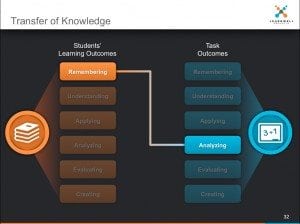Okay, let’s face it: Learning is a human function. Kids learn naturally and effortlessly well before they become students. Students learn complexly in their non-school endeavors. Yet when it comes to education, students — young through old — use an unnatural approach to learning, a method that leaves students perplexed and educators frustrated. Below are three research-based facts students must understand about memorization so they can advance toward deeper learning and higher performance.
1. Memorization is the beginning, not the end of learning. 
Whether working with college or high school students, kids or adults, I’ve realized that students attribute their academic success to great memorization skills. The percentage of study and reading time students spend simply on memorizing is not only astonishing, but it is unnatural. The human brain innately uses a range of thinking skills when interacting with the world.
Beginning at around two years old, toddlers incessantly ask, What is this, Mommy? What is that, Daddy? I call this the “what stage.” This is a basic stage of learning in which kids are acquiring and storing information in their little minds. Soon afterwards, at around three years of age, children advance beyond asking what questions to asking why questions. It’s as if their minds have accumulated enough basic information and now want to make sense of what it has stored.
Children effortlessly progress from wanting only to identify objects to needing understanding of why the objects exist. Students must allow this natural mode of inquiry to unfold throughout their academic lives.
2. Memorization has distinct characteristics.

Students habitually make improper judgments about their knowledge. They often report recognizing the content on tests, but they are not prepared to interact with the content in the ways that exam questions demand. Students need to know that memory-based knowledge is both fragile and fleeting. Information processed only at the memorization level is delicate. Students must use other thinking skills, along with memorization skills, to fortify their knowledge.
Students need to realize that memorized information will vanish! It’s not a question of “if” but “when” their knowledge will be inaccessible. How many times have students become excited as they recognized that the wording of a test question matched material they’d studied, only to find that the knowledge they had accumulated was missing in action? This is a chief cause of the widespread sentiment among students that teachers are trying to trick them on tests. The students didn’t do anything necessarily wrong when studying. It’s just that memorized knowledge requires an adequate cue to activate it, and rigorous exams are cue-less.
3. Memorization feels like learning, but is actually not learning. 
Memorization is a wonderful counterfeit for learning. As students memorize, they accumulate learning outcomes. They are able to recall and retrieve terms and ideas from memory that they were completely or largely unaware of before studying. This process of accumulation creates feelings of mobility in learning, internal affirmations that students are moving along and progressing in their knowledge. However, they never move beyond the shallowest type of interaction. In essence, they never stop asking what questions. They actually short-circuit their mind’s instinctive desire to follow up those what questions with a deeper string of questions.
You can read more about the direction of learning in the article Why Good Students Do Bad’ in College at: http://bit.ly/1bERkXs.
The ThinkWell-LearnWell™ Diagram and Learning Sufficiency Diagram have been used by thousands of students and educators to help students independently navigate toward deeper thinking and more meaningful learning. They can be freely downloaded at: https://thelearnwellprojects.com/resources-2/.


I have always struggled at looking at the “big picture” of class material, instead of just memorizing information and definitions. Recently, however, I have been getting better at looking at the big picture and it has been helping me tremendously in my classes, especially with biology where it is extremely important to not just learn information, but make connections throughout every topic.
I agree that memorizing things will be gone eventually because i have realized that after I take a test, a few days later, some of the information has left my mind. I remember some things but not all things from the test. I have also been struggling a little bit in college because I am better at memorization for a test than analyzing things. I feel that is something that I need to work on and start to ask myself why is that and what does it do rather than memorizing what it is.
This was an incredible article. Throughout my high school career teachers were giving tests based of memorization. With that being said, I got to college and prepared for my tests by memorizing and rereading everything I read because I thought that is what I had to do. Even though, it did not help me on the test I still continue to do it but I am trying to find other alternatives to help me find what study strategy fits me best. I have learned to take notes and read the content or context for enjoyment not for the matter of just reading. It is hard for me to apply all the information I know and answer it within a question that is given. I can always explain to what I want to say but can never fine the words to put down on paper. When I am taking a test, I go into my ‘file cabinets’ and fish out all the things I can remember about the topic or word and give it my best effort to apply it in questions or discussions we might have in class.
I agree that memorization is not the most effective way of learning. In fact, it is not “learning” at all because memorized information is not retained for a long period of time. It does feel like I am “short-circuiting” my brain by memorizing. I recognize that college will require me to do more in-depth analysis and think about the way I think. Asking myself “why” something is the way it is helps me to work through major concepts and put them in my own words to better understand them. In the future, I will try to keep this in mind and open my mind to active, engaged learning.
Before coming to college, I had never heard of the term “metacognition.” I had never thought about the concept of “thinking about how to think.” Now that I am a college student, I know that it is important to expand my way of thinking and how I articulate information. This article talks about memorization and how we as humans adapt and advance our ways of thinking, but at the same time do not advance at all. We still tend to articulate information and memorize information basically the same way we did as a child. To be honest, I tend to just memorize information for some of my classes, such as science based classes. I understand that by doing this I am not actually learning because that information will soon be forgotten. By thinking about how that information works, I would have a better chance of retaining that information for a much longer period of time. I think that what Lenard talks about will actually help me with studying in some ways; however, I am a creature of habit, so I will probably continue to memorize certain information, but I will try my best to think of it in a metacognition way.
Coming in to college I never heard the word metacognition, and I don’t think that many people have. The process of “thinking about thinking” is something I have never been exposed to. In high school it was easy to just cram all of the material right before the test and then forget all about it when it’s over. In college, you definitely have to be more disciplined when it comes to studying and the acceleration class we had really helped me learn new techniques that would help. Thinking about you thinking and realizing what steps you need to take in order to meet that end goal is key when trying to learn something and truly grasp it. The tips that Leonard gave us really helped me this semester and I will definitely use them once finals approach.
I agree that memorization is not necessarily the best learning method and is otherwise known as a “fake” way of learning. Being a nursing major I am required to take a foreign language, which I often find myself cramming these words into my brain so I will know them for an upcoming test, but after a few weeks I no longer remember them because I did not critically think about the words so therefore I did not learn them. I just temporarily memorized them. It just short-circuits my mind for the time being then it quickly disappears if I do not need them after a short period of time. From now on when I study especially my harder subjects, I am going to do the following steps that you provided for us: Identify, Explain, Apply Information, Compare/Contrast, Make Judgments, and to Introduce/Develop a Viewpoint. I am hoping these tips help not only me but the rest of my class as well. None of us are perfect and we could all use some help with our studying.
Mondays class taught us how we apply learning methods to help our powerful brain keep running as it should. We talked about how to we beat procrastination and get past the writers block. Monday’s class taught us that an idea is the trigger, and when we pull that trigger it wont fire without the gunpowder, and that gunpowder is our ideas. Remembering, understanding, applying, analyzing, evaluating, and creating are all essential to keeping your ideas flowing. It’s thinking about thinking that can bring your metacognitive learning goals to the final production. To think about thinking and to apply your thoughts to your goals can bring your ideas and creativity to production which makes it easy manage your time wisely and being the mind to focus rather than to play.
I was absent in Dr. Deckard’s class on Monday, but I was informed that the class was about metacognition and I have also read your article. I think this relates to us college students so much. I am sure that not only me but most of my fellow freshmen were slightly surprised at the fact that most of our college work is to be done out of the classroom. While in high school we did most assignments in class, and then turned them in before we left. I think I much rather prefer doing what we do now. We get the chance to learn so much more! When we do our work outside of class it gives us a chance to dig deeper and actually learn something, rather than just doing the assignments just to get them done. For example, in my anatomy class, we learn definitions and what parts of the body are (bones, muscles, etc.) but then with the physiology part we must learn how all of those things come together to create our functioning body. We have to go beyond just memorizing the names of things but then ask how they work and why they work. I enjoyed your article very much and I appreciate you taking the time to help all of us out by giving this information. Hopefully we will all take it to heart, and it will assist us in our study habits so that we can all become better students! Thank you.
In class on Monday we discussed on how to go through six steps to help you with study habits. What I really enjoyed about class was I felt like these steps have pushed me to the next level. I feel like I am a really good student, but there is always room to improve. This has not just helped me memorize information about a certain subject, but has allowed me to dig deeper, and grow. I absolutely loved the class and really appreciate the time! Thank you Leonard!
Metacognition is a word that not many people understand. The first time I had ever hear the word was last semester in Deckard’s class. Most of the time, we don’t think about thinking; we just think because it comes natural to us. Reading this material and hearing Leonard talk us through this “studying” process really opened my eyes. In high school, all we ever did was memorize answers, so that’s the same way we study for college. However, as most of u students can tell, by our grades, we quickly realized that our same study habits from high school weren’t working in college. It isn’t necessarily that the work in college is harder, we just think it is because we don’t study deep enough. We have to go beyond memorization. We have to be able to apply, analyze, evaluate, and create which takes you to a completely different level of “learning.” A lot of times, in my business class, I’ll study for my test and think I will do good on it. Then I get my test and there are a bunch of different scenarios and I have to figure out which answer would be the best option. It isn’t a yes or no answer, and many times there is more than one possible answer, we just have to choose the best one. I want to personally thank you, Leonard, for taking the time to figure students studying habits out. Like you said, professors just get frustrated, but they don’t realize our struggles. It isn’t that we aren’t smart; it’s just we don’t know how to study. But, thanks to you, we have had our eyes opened to a new way of studying deeper and hopefully that will help us all out!
This is really helpful information when trying to understand how to study and learn for college classes. There is definitely a big difference in the way we learn in high school verses college. I can definitely see how the 20, 80 rule apples in college. Twenty percent of what we learn in college is in class and the other eighty percent is outside of class. I have noticed that in most, if not all, my college classes that everything we are learning about has to be analyzed and applied. There is no longer just the memorization rule. Yes, memorizing the definition may help, but to really learn anything about it you have to connect on a deeper meaning and know how to think about the deeper meaning. We now have to use metacognition (thinking about thinking) as you mentioned when talking to our class at LR about these concepts.I have also realized that a lot of times in college classes there may not be that straightforward “right or wrong” answer. As long as you can support what you are saying and use good reasoning then students will do okay.
In class we went over the steps to learning and how each step tested our knowledge of a subject. In the article it shows how memorizing is not a bad way of studying, but you have to also think about what you are learning. With that you have to look further and ask why is this important to the subject you are learning about. I feel this is relevant to me because this is exactly how I study and I see why sometimes when i come into a test I am not best prepared as I should be. I tend to memorize the information and not why something does what it does for a reason. I am glad to see actually how memorizing can deal with your life on a daily basis also. With the little kids they do not know what they are doing at the time but as we see they are going down the chart to understand and relate to the information given to them. I feel with knowing this now and by using the chart to better my study habits I will see progress in my test grades and my study skills.
I’m one of the students from the session in Dr Deckard’s class today. This was interesting! I’ve observed myself following a lot of these steps when planning stories (identifying potential cues for themes and asking ‘why’ for character motivation, for example). That development of skills seems to have translated over well to college work, as I was an awful student in high school but doing well now.
Great material. My son and I just watched your YouTube video on deep thinking. It was very informative. He actually wanted to pick up the phone and call you! It obviously made a positive impact on him. As an educator and the mother of a soon-to-be college student, I really appreciate all of your efforts in laying the groundwork for those coming after you. Thank you for all that you are doing. Keep up the excellent work!
Hi Pamela,
I REALLY enjoyed working with you and your colleges at Shelton State! I love your campus! I am pleased that your son found the video useful. Be sure to follow (or have him follow) the blog as I will be posting more videos and other content in the near future. This will ensure that you are notified when new material is posted. You can follow by simply checking the two boxes at the bottom of each blog post.
Also, your son can feel free to contact me. My contact information is on located at the bottom of the handouts that were disseminated during the workshop.
Best wishes to you and your son!
What a great resource for sharing with my tutors! Many younger college students, especially, do not realize why their study habits are no longer producing the results they were using to succeed in high school. They need to learn the limitations of memorization, which you have listed.
I love the illustration from the way learning that takes place naturally in childhood: the stage of asking “what?” is followed by the stage of asking “why?” Is the “how?” question also characteristic of a certain stage, and if so, where does it fit in the progression?
Lois, thanks for your response. Younger students do struggle; however, unfortunately many upperclassmen are unable to move beyond average performance because they never learn to advance beyond memorization. Metacognitive researchers have found that capable, effortful students who fail to move beyond memorization will struggle to make above average grades in rigorous courses. The research further suggests that their grades will actually begin to decline. Perhaps this explains why so many previously successful students pile up in middle and toward the bottom of the grading scale.
I am not so confident that the “how” stage consistently precedes the “what” and “why” stages. Thinking back to my human development studies days, this would all depend on the tasks and how familiar children see a specific task in operation within their environment. Toddlers unknowingly absorb many habits from their day-to-day interactions. So they may not even be aware that they have learned how to do something.
Toddlers may operate at the “how” stage with more concrete items such as using crayons or riding a bike without desiring to know why they are using them. However, kids’ curiosity seems to kick in as they come into contact with less-familiar items. They then want to know what things are, why they are, and perhaps their desire to touch and/or play is their means to discovering the “how”?